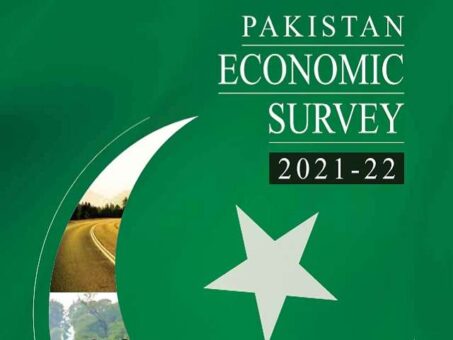ISLAMABAD: After achieving GDP growth at 5.97 per cent in the fiscal year 2021/2022, the economic growth to be slow down next year, according to the Economic Survey of Pakistan released on Thursday.
The survey stated that Pakistan’s economy faces several severe challenges. Inflation is running too high, the prospects for future growth in potential output are challenging.
READ MORE: Per capita income in Pakistan rises to $1,798 in 2021-22
Fiscal deficit is at a level where its financing is becoming challenging. Further, high trade deficit is leading to external imbalances putting extra pressure on foreign reserves and on the exchange rate. “Economic growth seems to be slow down next year,” it added.
Moreover, high uncertainties are restricting market confidence. In the short run, Pakistan is confronted with the challenge to finance its external finance requirements stemming from current account deficits and foreign debt servicing.
READ MORE: Pakistan achieves 5.97% GDP growth in 2021/2022: Economic Survey
Successful conclusion of the seventh review of Pakistan’s reform program which is supported by an IMF Extended Fund Facility arrangement is on the right direction.
The government is very much committed to ensure the stability and confidence in the economy.
Stable fiscal policy with a higher, growth promoting path for Public Sector Development Program (PSDP), based on physical and human capital development will be obligatory.
READ MORE: Pakistan may increase normal sales tax rate to 18%
Likewise, subsidies targeted to stimulate development of innovative industries and services will be essential. On the revenue side, growth-oriented revenue policies will be helpful. There is intense need of creating an environment conducive for investments.
Further, the investment must be capable of considerably augmenting the share of GFCF in GDP as well as increasing the efficiency to create additional welfare. Investors and consumers need to be convinced of a long term sustainable and inclusive growth project that inspires confidence in Pakistan’s economic future and that induces them to take initiatives in their own and in the country’s interest. Thus, well-functioning competitive markets is required.
READ MORE: PM Shehbaz assures favorable measures on CNIC requirement
There is also need to continue policies which brought improvement in related sectors. For example, Prime Minister’s Agriculture Package and related agricultural policies remained more effective for better agriculture performance. Likewise, policies related to energy mix and efficient energy supplies.
Furthermore, there is also need of stable legislative and political culture.
READ MORE: New tax measures likely in budget 2022-2023
As a result of these, it is expected that potential output growth will be upgraded, resulting in higher employment and real income growth. It will also create additional capacity for exports and import substitution and a stable exchange rate environment.
Thus, demand management fiscal and monetary policies should on average be neutral and play their role of cyclical stabilizers when temporary shocks create deviations from the long-term growth path.
